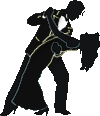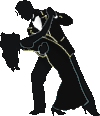
Ballroom Dance
J M (Mike) Nelson
Email:jmnelson@cloudnet.com
Phone: 612-810-0157

| jmnelson.com | Dance Home Page | Dance Curriculum | Dance Articles |
 |
Ballroom DanceJ M (Mike) Nelson |
 |
The Dance Student: Idiot or Genius?Dance studios often treat their students as both idiots and geniuses, rarely as normal. Dance Students Are Idiots. The following encounters, not atypical of most traditional dance studios, seem to treat dance students as though they are incapable of reflective thought or even cursory insight into the relationship of the basic components of dance. Further, that they cannot assimilate new information regarding even definition of terms. There is another possible explanation, which I will address at the end of this section, but I doubt that any studio would admit to its validity. The dance instructor was teaching Hustle and counting, "and, one, two, three, and, one, two, three, . . .." Having not yet heard any music, I asked whether Hustle was danced to 3/4 or 4/4 music. He seemed perplexed at my question, so I clarified by suggesting that since the count was a three-beat cadence, then perhaps the Hustle was danced to waltz music. That got his attention, finally understanding the initial question, or at least the reiteration. I never received a definitive answer, but clearly Hustle was not designed to be danced to music in 3/4 time. I then asked what happened on beat four in 4/4 time. I was told not to be concerned, simply count, "and, one, two, three, etc." The implication was that students were incapable of relating the cadence of the dance to the cadence of the music. (Incidentally, Hustle fits rather well to music in 3/4 time, perhaps because it has a three-beat cadence.) The dance instructor was teaching rumba as "qqs." Privately, after the lesson, I asked whether the "s" was on beat one or beat two. He said he didn't get into the details; he just wanted his students to enjoy dancing rather than get into the technicalities of connecting the steps to musical beats. The implication was that his students could not even be presumed capable of counting to 4! The dance instructor was teaching Cha Cha as "slow, slow, quick, quick, slow," without music. After she had drilled us in the basic step and was about to start some music, I asked whether the cadence she had just taught began on beat "one" or "two." She seemed perplexed and said that you just followed the rhythm of the music. When the music began, it became clear that, according to her, the cadence began on beat one. Not only was this a clear departure from the traditional syllabus, but her response indicated that we were incapable of associating the cadence she was teaching with the music; though associating cadence with music is something most dancers consider routine. Dancers Are Geniuses. The following, again not atypical of most traditional dance studios and pre-dance lessons, seem to treat dance students as though they have extraordinary mental capabilities, able to absorb and remember a plethora of data sans any available persistent media. The dance club crowd was gathered for the lesson, and the guest instructor began teaching a variation. Impressed that most were able to replicate immediately, the instructor complimented our abilities and continued to have us replicate numerous variations. By the end of the hour, we had replicated perhaps a dozen variations, but, when the regular dance started, we could implement few if any. Our capacity for short term memory had been exceeded, and we had not had enough repetition for new information to be moved to long term memory. Such information overload is common for both group and private lessons, beginning as well as advanced. Beginners are generally overloaded because almost all the information is new, and advanced students are overloaded because they can replicate in the moment much more than they can retain. Whether by ignorance or design, the result is that the dance student often requires many more lessons than necessary. Dance Students are Normal. There is no reason to believe that dance students are not of average intelligence, neither idiots nor geniuses. It is the rare adult in a dance class who lacks to intellectual capacity to understand most dance terminology and relationships, especially give appropriate requisite information. Dance teacher behavior seems to indicate that we are treated as idiots because the teacher cannot articulate some of the relevant information in a systematic, succinct manner; thus they simply dismiss it as irrelevant. In contrast, when we are treated an geniuses, capable of extraordinary feats of memory, it is more likely because the teacher has little awareness of the psychology of learning and the limitations of human mental capacity, or, even if they do, they do not know how to use such information to improve their course design. The consequence, however, is that the student requires many more class sessions than necessary were the material presented in a systematic and pedagogically responsible manner. (Though this is to the economic advantage of the teacher/studio, there is little evidence that it is deliberately implemented for economic purposes.) There are many factors that lead to this incongruity, and most are traceable to tradition. Psychologists know a lot about human learning, but that knowledge has had little effect on education. We tend to keep doing what we have been doing rather than consider the implications of new information. Like colleges and universities, the requirements for teaching dance is the ability to perform, and even certification requires performance of the dance, not the ability to teach. Perhaps the most telling and disconcerting aspect of this phenomenon is that most people give it little thought, or seem to lack concern if they do. This does not speak well of us as a species that purports to be intelligent. For related information, see: Ballroom Basics: Critical Comparison Teaching Ballroom Dance: A Rationale For an Alternative Approach |
| jmnelson.com | Dance Home Page | Dance Curriculum | Dance Articles |
Copyright (c) 2006, J. M. Nelson. All rights reserved. Reproduction of contents prohibited without prior permission from the author.